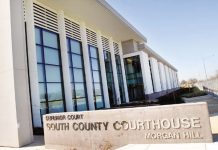Citing a history of illegal activity at some local massage
parlors and a state law that could affect existing regulations,
Morgan Hill Police have proposed temporarily halting the processing
of new licenses for massage practitioners and any establishments
that employ them.
Morgan Hill
Citing a history of illegal activity at some local massage parlors and a state law that could affect existing regulations, Morgan Hill Police have proposed temporarily halting the processing of new licenses for massage practitioners and any establishments that employ them.
Wednesday night the city council will hear a proposal from the MHPD, which is currently in charge of issuing the license for local massage therapists and related service providers. The department is concerned about how a state law that will go into effect Sept. 1 might change the way local regulations are enforced and local establishments are run, according to Cmdr. David Swing.
The city currently requires both individual massage practitioners and businesses that offer massage services to acquire an annual license and renewal. California Senate Bill 731 will establish regulations on the massage industry at the statewide level for the first time. The new regulations include the establishment of the Massage Therapy Council, a nonprofit group that will be in charge of all licensing and guidelines related to massage therapy services in California.
Morgan Hill Police want to impose a 45-day moratorium on new licenses, subject to council approval, in order for staff to ensure the local ordinance is consistent with the new state laws, and determine how the new laws will affect local existing practitioners.
“We as a local government are not yet sure what the impact will be,” Swing said. “We are proposing a moratorium on new licenses until we can better understand what those ramifications are.”
Other cities in California, including Torrance and Simi, have enacted similar moratoriums in recent months.
Most cities have had law enforcement concerns with massage parlors and spas, Morgan Hill Police Chief Bruce Cumming said, and Morgan Hill is no exception. Many of those problems are related to offering illegal sexual services, which is specifically prohibited in city code, not to mention state laws against prostitution.
Within the last year, MHPD has received eight service calls regarding allegations of sexual acts in two Morgan Hill massage parlors. Swing said one of those, on Jackson Oaks Drive, recently surrendered its license and is no longer in business.
The other one, near the intersection of Monterey Road and Cosmo Avenue, is still in operation with a license. Police have received a series of complaints from neighbors and customers about the business and are conducting an investigation but have not made any arrests or filed any charges.
Cumming added that about a year ago, the city shut down a massage establishment on Main Avenue because of allegations of sexual acts taking place there.
“We are very careful with massage practitioners, and we want to tread carefully,” Cumming said. “We want to have the ability to (enforce regulations) properly.”
Other problems at local massage providers include locking the front door while massaging, and operating under false names or without licenses.
Cumming said police follow strict local regulations on massage practices. The city code regulating massage practitioners and businesses allows police to conduct a background check on applicants. It requires all licensees to be at least 18 years old and have completed a certain amount of education and training specific to the field. It also prohibits massage therapists from wearing revealing styles of clothing such as mini-skirts and bikinis.
Furthermore, the ordinance generally prohibits applicants who have been convicted of most crimes from gaining a massage license, and specifically those who have been convicted under the Red Light Abatement Act, a state anti-prostitution law dating back to 1914.
Currently there is no regulation of massage parlors and spas at the state level, according to Massage Therapy Council Executive Director Cheryl Oliver. Most cities in California have individual ordinances to regulate the trade and set out requirements for obtaining and keeping a permit.
SB 731 requires at least 500 hours of training for massage therapists who want to be licensed, and requires applicants to pass a background check. Therapists and practitioners would pay a fee to the state council to become licensed, and would have to pass a test administered by the organization.
Oliver noted the licensing will be voluntary, though some cities or counties may choose to amend their ordinances to allow only state-licensed practitioners to set up shop in their jurisdictions.
Massage professionals currently permitted by local police departments would not be automatically licensed – they would still have to qualify for a state license, Oliver said.
The council has sought the assistance of law enforcement authorities in establishing the requirements for a state license, primarily due to the recurrence of massage establishments fronting for sex services.
“We’re working closely with law enforcement to help them get a better grasp on the massage practitioners who are not just massage practitioners,” Oliver said.
There are about 50 licensed massage practitioners in Morgan Hill, and about a dozen licensed establishments, Cumming estimated. He said most follow the existing ordinance.
In the state of California, there are about 40,000 practicing massage providers, Oliver said.
A staff report presented to the city council estimates about $1,000 in licensing revenue would be lost during the 45-day moratorium.
The city council meeting will take place 7 p.m. tonight at City Hall council chambers, 17555 Peak Ave.













